So, you picked “trick”. Well, guess what? You’re actually kinda in for a treat! Over the years, we’ve discovered that there are several tactics that companies use to make us feel like we’re buying a product we can be confident about. When in reality, these marketing tricks work to essentially fool us into thinking what they’re selling is what’s best for us. If this has happened to you, don’t sweat it, girlfriend. The journey to using organic products is not always a smooth one – we can vouch! We’re ready to share all that we’ve learned with you in this one (so don’t regret clicking “Trick” just now, you rebel, you!). After this blog, you’ll know all about the beauty marketing terms that trick consumers with false or misleading claims, and you’ll be able to spot them from a mile away, babe.
The trick that just keeps misleading consumers… “Fragrance”.
We know, “fragrance” sounds harmless, right? I mean, who doesn’t like to use a product that leaves them smelling and feeling fresh as a daisy. Well, think again honey.
You should know that when companies use the word “fragrance” on their list of ingredients, it can sometimes be a way to avoid disclosing the specific chemicals their fragrance is actually composed of. Essentially, it is often used as a catch-all term that could shroud almost any ingredient. Studies have shown that fragrance can be linked to negative health effects such as migraines and asthma. Moreover, long-term use of highly fragrant products has even been linked to gastrointestinal issues and cardiovascular problems.

Now, before you go thinking that you’re destined for a life of scentless products, we should also mention this. Some companies use ingredients like essential oils to provide you with a little something-something to bask in, sans icky side effects. Stick to these gems, and you’ll still be able to enjoy the experience of applying a product that smells great! And as for products that only list “fragrance” on their ingredient list without any further explanations? We recommend avoiding those nasties.
“FDA Approved”… The misleading term you should be weary about.
We’ll admit it. Reading the words “FDA approved” can sure foster a sense of safety and ease when you’re looking at a sea of beauty products. This is a beauty marketing term that so often tricks consumers, and that can be a *very* misleading claim.
While the FDA is responsible for protecting public health by way of regulating a slew of products (including cosmetics), it does not “approve” products or companies. In fact, many items that are available for purchase at your fave beauty store often do not go through a pre-market approval. Many times, the FDA focuses on regulating products after they are available for sale. Pretty wild, right?
In a nutshell, anything from the labels on makeup to the ingredient lists on shampoos does not require an FDA approval before it hits the shelves. And stunningly enough, there is only one exception to this rule: color additives. All of this to say, coining a product as “FDA approved” is a serious way to mislead babes into buying something that has not necessarily been reviewed by a government authority, and that ultimately may not be that safe to use.
So the next time that you read an “FDA approved” claim, be weary babe. This may not be legit and can signal that the company is trying to overcompensate for harmful ingredients they included in that item. But hey, you’ve got us and you know better!
The appealing claim that isn’t what it seems to be: “Maximum Strength."
Next up on our list of Beauty Marketing Terms That Trick Consumers with False or Misleading Claims, is a term that makes most babes assume a product is *super* effective. In reality, though, it is more of a tactic to trick your mind by using some intense vocab.
When you see the word “maximum strength” on a product, this often refers to there being a higher concentration of the active ingredient in the item compared to a “regular strength” version. Here’s the catch: this does not mean that you are actually purchasing a product with the highest strength available.
Additionally, when people try products that claim to be of “maximum strength” and they don’t work, well, it’s discouraging to them. It creates a sense of belief that “if this product didn’t work, nothing will”. When in reality, that is not necessarily the case. Catching our drift? Cool. Now you know!
The tricks organic beauty loving babes need to watch out for: “Greenwashing Terms”.
We’ll be way up front here, because we are your besties in all things “natural” beauty. We say that all of the time, right? So here’s the deal. There are “greenwashing terms” that we have totally used, however our solid ingredient lists can always back them up. This isn’t always the case with all companies, which is why you should be aware of what “greenwashing” really is.
When you see words like “clean”, “natural”, or “non-toxic”, you still need to do your due diligence and read the actual ingredient label, babe. Often, beauty companies can abuse of these trendy words to reel you in, without really being able to substantiate their claims. Keep an eye out for these types of beauty marketing terms and remember that the list of ingredients will tell you all that you need to know.

“Dermatologist-approved”… The claim we hear over and over again.
Ok but, by which dermatologist? Do we know them? Where do they work? Where did they study? We’ve got questions!
“Dermatologist-approved” does not mean a product is safe, or that you should use it. Additionally, this term has no legal standardization or meaning. Oftentimes, this claim means that a dermatologist may have been part of a clinical trial on the product, or that one may have tested it. However, it does not mean that a dermatologist mixed up any of the formulas in those beauty or cosmetic items.
Most products are invented by formulating labs, and there’s nothing inherently wrong with that. But if you see words along the lines of “dermatologist-approved”, be skeptical about why the company feels the need to use this beauty marketing tactic.
“Naturally-derived”… The innocent claim you didn’t know could even be a trick.
This list of Beauty Marketing Terms That Trick Consumers With False or Misleading Claims just keeps getting better and better. Or maybe we should say, more surprising! “Naturally-derived” might sound like something you want in your products but (you guessed it), it doesn’t always mean exactly that.
You can consider this next beauty marketing trick as another form of greenwashing. All that it really means, is that the ingredient *started out* as a whole plant. It doesn’t mean that it ended up that way, though. You know, after it was completely chemically altered and messed with.

This term often misleads beauty buyers into thinking they are getting a “natural” product, or one that is free of toxic chemicals. In reality, the ingredients are often still over-processed and far from where they started out. Keep an eye out for this trick and consider it as a red flag that the company may be trying to hide something nasty. But nothing gets past you!

The misleading claim you’ll want to double check: “Chemical-Free”.
Yeah, this one definitely sounds too good to be true. At this point in this Beauty Marketing Terms That Trick Consumers with False or Misleading Claims blog, you already know what’s up.
We’re just going to come out and say it. Labeling a product as “chemical-free” holds no meaning. Chemical ingredients are used in all beauty products, but that doesn’t mean that they are necessarily bad for you. In fact, you can find good chemicals in so many of your favorite items!
Again, we recommend being skeptical of brands that are trying too hard to create a “chemical-free” image. This is another form of greenwashing, and you deserve better than that, beautiful.
The easiest trick to underestimate… Using the term “Natural”.
We have definitely used this term in the past and had no bad intentions in doing so, girlfriend. You know us, and that’s just not our style. However, we’d be remiss if we didn’t warn you about companies who use this word as a beauty marketing trick to mislead you.
Once again, labeling a product as “natural” has no legal bearing and it is actually an unregulated term. Meaning, the FDA doesn’t back it up and you shouldn’t have faith that the item is indeed totally “natural”.
Now, we get how tempting it can be to use this term. Especially because there are only so many synonyms for the words “natural” or “organic”. And while the product may indeed contain natural ingredients, it does not mean that it is completely devoid of harmful chemicals or substances. As always, a good rule of thumb is to check the label and if you notice that the so-called “natural” ingredient is way at the bottom, that means that the product is not so “natural” after all.
The total distractor: “No Junk”.
We know, we know! We use this term as well! However, we use it as part of a broader conversation on ingredients and like we previously mentioned, our stellar ingredient lists can back it up!
Here’s the thing, though. Some companies use this trendy phrase as a way to distract you from what is in their products. Which is why you should always research what you use. You know what they say, babe. Want something done right? You gotta do it yourself.

The other total distractor: “Non-Toxic”.
Full disclosure, here. We have definitely heavily used this phrase in the past but are consciously moving away from it. And while this term does have its merits, it can be *way* confusing for consumers because it does not have any universal standard.
Think of it this way. Gluten is toxic if you’re allergic to it but completely harmless if you aren’t. Therefore, should it be considered toxic or non-toxic? That is where the dilemma lays.
At BBE, we still use this term if the ingredient in question has been shown to cause substantial health repercussions in multiple studies. You know, because we like to do our beauty homework.

And finally, the last beauty marketing trick you should know about: “Lying by omission”.
Lastly, we know you’ve heard this one before. “This unreal beauty product has been clinically tested and you should trust this claim and buy it!”.
Ok but, by who? Where? When? What was the testing sample size? Babe, we always have these questions! And the truth is, that these advertising claims can be downright misleading. Research has shown that so many superiority claims can be categorized as false, and you should be aware of that.

Claims like “inspired by science” or “this product is clinically tested” omit information on where and how the product was actually tested. Meaning, these companies are simply lying by omission. You know, like when you don’t want to tell your bestie that furry vest should have stayed in the back of her closet where it belonged.
There you have it, babe.
You are now totally brushed up on some of the most prevalent Beauty Marketing Terms That Trick Consumers with False or Misleading Claims. And babe, you’re totally better off for it.
Until next time,
Research & Realness,
Carey<3
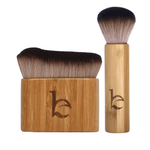







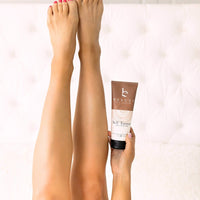








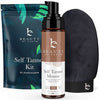

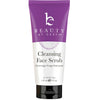


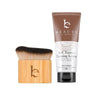









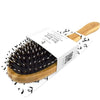
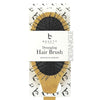
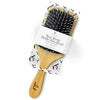

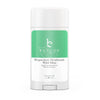



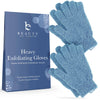
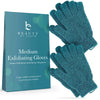
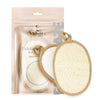
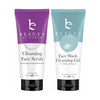










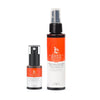




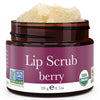
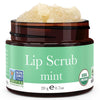
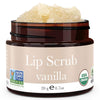





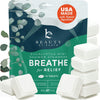
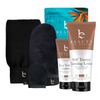
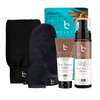















join the conversation